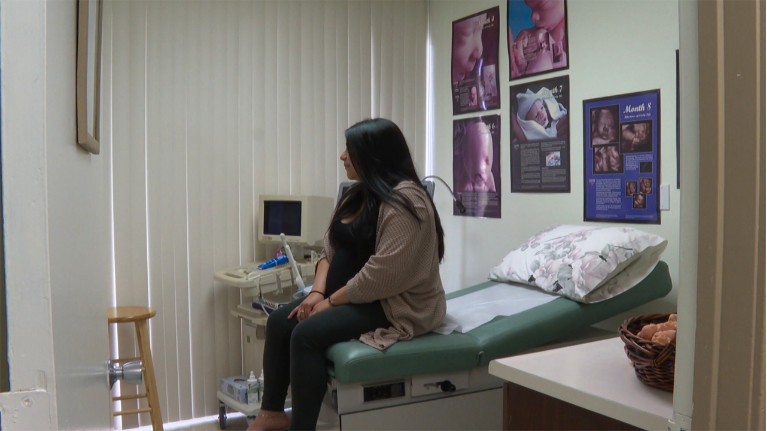FRANKFORT, Ky. — Illegal abortions could be prosecuted as murder under a new Kentucky bill proposed by a Louisville Republican.
What You Need To Know
- A new bill filed in the Kentucky House aims to make the unlawful termination of pregnancies "subject to the same legal principles as would apply to the homicide of a person who had been born alive"
- That means illegal abortions could be prosecuted as murder
- Kentucky Right to Life, Attorney General Daniel Cameron and House Speaker David Osborne have all come out in opposition of the bill
- Abortion procedures are already illegal in most circumstances under state law, but the state's two abortion clinics have challenged the restrictions
Filed this week in the state House of Representatives, House Bill 300, dubbed the “Prenatal Equal Protection Act,” aims to make the unlawful termination of pregnancies “subject to the same legal principles as would apply to the homicide of a person who had been born alive,” the bill reads.
Kentucky Right to Life, the state’s leading anti-abortion coalition, came out in stark opposition to HB 300 on Wednesday. Right to Life unequivocally does “not support any measure seeking to criminalize or punish women,” Executive Director Addia Wuchner said in a statement.
“While we respect the passion of the sponsor of HB 300 and her sincere desire to end abortion and save innocent lives of unborn babies, we are greatly concerned that under the proposed legislation all parties to the abortion, including the mother of the child, would face criminal charges,” the statement reads.
Wuchner also “respectfully urged” lawmakers to reject the bill “and any measure of the bill that seeks to criminalize women who have abortions.”
Under Kentucky law, criminal homicide is determined when someone is “guilty of causing the death of another human being” under circumstances constituting murder, manslaughter or reckless homicide. Rep. Emily Callaway (R-Louisville), the bill’s sponsor, is seeking to broaden the definition of “human being” to include an “unborn child.”
Abortion procedures are already illegal in most circumstances under state law. Kentucky is home to just two abortion clinics — both in Louisville, the state’s largest city. The clinics have challenged the trigger law and 6-week ban currently in place, and both are the subject of review from the Kentucky Supreme Court.
Attorney General Daniel Cameron (R), a candidate in the hotly contested GOP primary campaign for governor and vocal proponent of Kentucky’s so-called “Human Life Protection Act” currently under judicial review, also blasted the bill as “striking the wrong balance.”
“If adopted by the General Assembly, this bill would allow pregnant mothers who have an abortion to be criminally charged and prosecuted with homicide,” Cameron said in a statement to Spectrum News 1. “While I strongly support prohibiting abortions in Kentucky, I just as strongly support helping pregnant women. Pregnant mothers deserve our help, support, and life-affirming options, not to face criminal charges.”
Kentucky's Republican House speaker, David Osborne, said Wednesday that he anticipates other abortion-related legislation being introduced in the coming days, including proposals that would provide further exceptions when abortion would be legal.
Osborne gave a chilly response to Callaway's proposal to prosecute abortions as homicides. He said Kentucky lawmakers have “never passed a ‘pro-life’ measure that did not take into consideration the necessity for any exceptions, nor has this House majority caucus ever contemplated doing so.”
HB 300 marks one of the first anti-abortion pieces of legislation filed this year, months after a majority of Kentucky voters rejected a ballot measure that would have explicitly excluded any perceived right to abortion from the state constitution. That amendment’s defeat gave legal challenges to abortion bans slightly stronger standing, but the fate of the state’s abortion restriction remains unknown and in the hands of the Kentucky Supreme Court.
The state's trigger law targets doctors for prosecution for providing abortions in violation of state law, but pregnant women who receive abortions are not subject to prosecution. But the new bill introduced by Callaway did not appear to make exceptions for pregnant women.
The freshman lawmaker's bill would exempt abortions necessary to prevent a pregnant woman's death. It includes other exceptions for a “spontaneous miscarriage;” or for abortions provided only after “all reasonable alternatives to save the life of the unborn child are unavailable or were attempted unsuccessfully."
The measure would give the attorney general's office concurrent jurisdiction along with local prosecutors in prosecuting illegal abortions as homicides.
The Associated Press contributed to this report.



